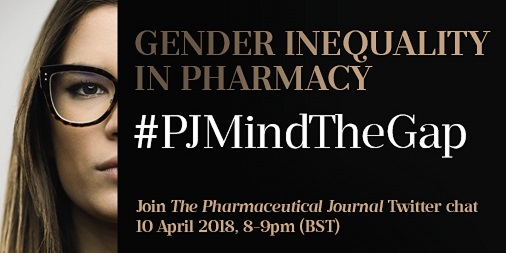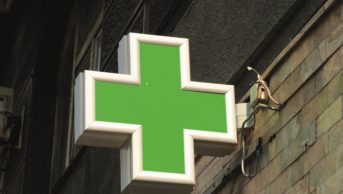
A lack of confidence, outdated attitudes towards childcare and inequality in recruitment at senior levels were all identified as barriers to women progressing in their pharmacy careers in The Pharmaceutical Journal’s first Twitter chat on gender inequality in pharmacy.
The Twitter chat, tagged #PJMindTheGap, attracted more than 150 participants, comprised over 1,200 tweets and made over 3m impressions, with a panel of pharmacist academics, executives, scientists, a pharmacy technician, a journalist and a pharmacy historian leading the discussion.
An analysis of the representation of women across the hospital and community health services workforce, published in March 2018, showed that more than half of ‘very senior managers’ in the NHS are male, despite more than 75% of staff employed by the health service being women. Those taking part in the Twitter chat said women in pharmacy were most likely to experience “imposter syndrome” and would often wait until they felt confident before applying to progress further in their careers. In contrast, men are more likely to put themselves forward for promotions or senior positions.
It was also mentioned that men were more likely to be promoted because of their potential, while women were promoted on the basis of attainment and achievement.
There’s research from USA that says women have to be asked 3 times before they will put themselves forward for office. Do keep asking. Have 1-2-1 discussion, maybe find someone the women trust/feel comfortable with to do the asking.#pjmindthegap
— Women in the City (@WomenintheCity) April 10, 2018
Tweeters also said the expectation that women must take responsibility for childcare was a considerable barrier to progressing when, in fact, times are changing and many men are keen to share caring for their children. While it is often perceived as impossible to have a family and a career at the same time, many women enjoy both, the participants said. Although it was said that returning to work after having children can be difficult without the right support.
I agree @HemsworthAlison I took some time out when my two were little went back to hospital pharmacy felt fish out of water #pjmindthegap
— Tess Fenn (@FennTess) April 10, 2018
Several women spoke from experience about how they had experienced “knockbacks” in their careers when trying to progress, for example when requesting additional training in order to gain further experience.
Others said there was a lack of equality in job recruitment at senior level and that some organisations were “unconsciously risk averse” to promoting women into senior roles. It was suggested that recruitment processes should be scrutinised to ensure that any unconscious bias is ironed out.
On the topic of unconscious bias, where individuals make snap judgements and assessments of people and situations without realising, several participants and panel members highlighted that female leaders are as guilty of bias as men. Participants said they had experienced other women feeling threatened by their success rather than congratulating them.
#PJMindTheGap Hell yes! @NomaPropharmace
#Metoo – I’ve called ‘weird’ ‘not normal’ – I do challenge the status quo and I have the confidence to try innovative ways of working. But it never stops me trying to provide the best patient care I can deliver— Helen Kilminster (@HPILLminster) April 10, 2018
It was highlighted that pharmacy has been a “majority female profession” for decades, long enough for things to have improved, but despite this, it still fails to be reflected in senior pharmacy roles.
The other factor to remember is that pharmacy has been a majority female profession for more than 20 years, so long enough for the pipeline to be well established
It hasn’t been reflected in senior roles so there are other issues than experience at play #PJMindTheGap
https://t.co/i0g1pfaWPO— Mohammed Hussain (@DigitalPhamcist) April 10, 2018
However, it was highlighted that men can also experience bias, particularly when it comes to traditional views of the roles of men and women.
I think many men might feel emasculated.
There are still dinosaurs about who have fixed ideas about caring responsibilities, breadwinning and gender roles.
Having discussed my intention to share caring responsibilities, some male friends make jokes.#PJMindTheGap— Brendon Jiang (@NZPharmer) April 10, 2018
Leadership is not just demonstrated in the boardroom, said Leyla Hannbeck, chief pharmacist and director of pharmacy at the National Pharmacy Association (NPA). Women are demonstrating leadership in pharmacy on a daily basis in a variety of settings and it is these women who can lead a positive change and act as role models to encourage and support other women to put themselves forward.
#PJMindTheGap Q7 plz don’t see career progression &senior roles as just reaching a Board room or executive level. There are plenty of women who are demonstrating leadership daily and many who run their own Pharmacy businesses, many who mentor others in various Pharmacy sectors
— Leyla Hannbeck (@LeylaHannbeck) April 10, 2018
Leadership bodies in pharmacy also have a responsibility to be inclusive, positive and be responsive where change is needed, the chat heard. As one participant highlighted, many pharmacy and healthcare organisations, including the Royal Pharmaceutical Society (RPS), NPA and NHS England, are currently led by men, and more women should be encouraged to step forward for board positions in these organisations.
7. Leadership bodies have responsibility to be as inclusive as possible, identify & be responsive where change is needed #pjmindthegap
— Tess Fenn (@FennTess) April 10, 2018
According to the National Association of Women Pharmacists, the organisation is currently in talks with the RPS about plans relating to gender and diversity.
Outline plans schedulded to be tabled by @rpharms next week. All part of greater engagement @claire6thompson
@CandDLilian
@hemant_lpc
@PharmaSupportDi
@the_pda
https://t.co/VjAnSjbfMx— NAWP (@NAWP_UK) April 11, 2018
Sponsorship, career coaching and mentoring were common themes in the Twitter chat and were considered to be of huge value to participants in terms of women feeling empowered to grow in their roles and have confidence in the skills they possess.
When asked what changes participants would like to see and how to achieve this, several participants said everyone in the profession can facilitate change.
8. We are the answer – our leaders can set the tone but unless we all change, nothing will happen #pjmindthegap
— Deborah Evans (@HLPharmacist) April 10, 2018
Programmes to support flexible working, transparency around pay, promotion and opportunity, shared parental leave and anonymised CVs were among the suggestions for improving gender equality in the pharmacy profession. It was also said that employers should create a safe space for discussions around gender inequality in order to generate a culture change in the workplace when it comes to the gender pay gap and inequality.
Panellists and participants encouraged each other to reach out and highlighted the supportive forums available, including the Facebook group ‘Women in Pharmacy’.
On 17 April 2018 at 6pm, Briony Hudson, a pharmacy historian, will be holding a free talk at The Worshipful Society of Apothecaries exploring the history of women in pharmacy.
And the RPS will be holding a women in leadership event called ‘Survive and Thrive’ on 27 June 2018 at the RPS London office and a crèche will be available on site to ensure that as many delegates can attend as possible.
7. @rpharms is committed to looking at challenges women face & how we can help address them, & enabling female talent to achieve its full potential. I’m hosting a #WomenInLeadership event on 27 June on this. #PJMindTheGap
https://t.co/psdstKVCTr— Claire Thompson (@claire6thompson) April 10, 2018
The conversation is still ongoing, so tweet your thoughts using the tag #PJMindTheGap to take part.
#PJMindTheGap Key Points we can all act on today to navigate complex career paths as women: 1) Find a #Mentor 2) Invest in a #CareerCoach to improve key skills e.g. negotiation 3) Join Supportive Forums Thank you for having me on the panel @CareersAnge
@HLPharmacist
@rpharms
https://t.co/mBc9EasodM— Oksana Pyzik (@OksanaPyzikUCL) April 10, 2018


